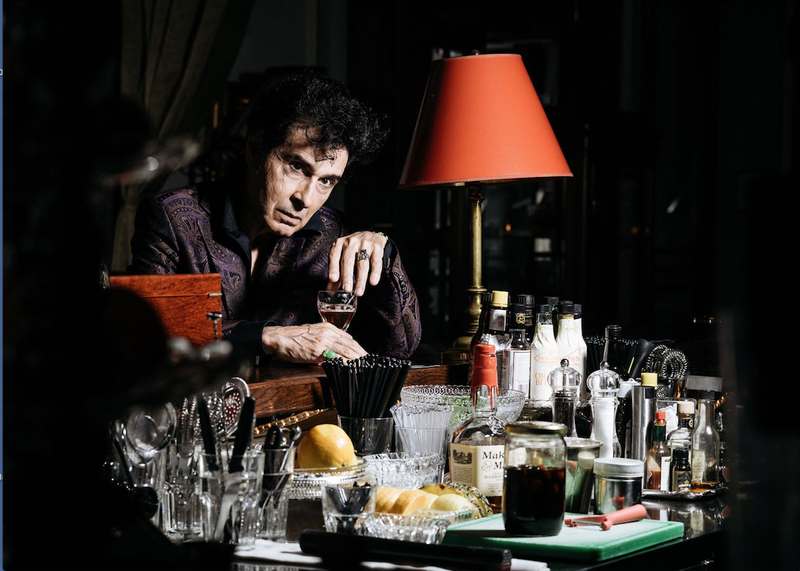It has been 40 years since Tav Falco unleashed his band, Panther Burns, on an unsuspecting world.
Founded in Memphis and inspired by the likes of Charlie Feathers, R.L. Burnside, Jimmy Reed and a nascent punk rock movement that favored energy and style over musical ability, Tav Falco's Panther Burns concocted a raw and primitive form of rock 'n' roll that was equal parts twisted-up art performance and earnest homage.
To celebrate four decades of Panther Burns, Falco -- born Gustavo Antonio Falco in Philadelphia and raised near Gurdon -- is on a tour that will bring him to Little Rock's White Water Tavern for a show on Monday. The 25-date U.S. trek is also to support his 2018 album, Cabaret of Daggers, an enchanting composite of blues, tango, jazz and garage rock. Searcy native Bonnie Montgomery will open.
The tour was threatened even before it started when Falco's gear, including his beloved black, violin-shaped Hofner guitar, was stolen while he and a bandmate were loading their van in Memphis.
"It was a devastating loss," he says from Berkeley, Calif., on the eve of the tour's first show in San Francisco earlier this month. "It was quite a jolt. We had our backs turned one second too long."
Along with the guitar, his wardrobe, laptop, phone and a piece of equipment for a movie camera were also stolen. Happily, he has found a replacement Hofner from Texas that will suffice, and was awaiting its arrival in Berkeley.
"We forge ahead," he says firmly, his Southern lilt and manners still charmingly in place even after years of living in Vienna. "Nothing can shut down Panther Burns. I'm ready to go out and do battle."
The band started as part of the late '70s Memphis underground, but Falco's performance art leanings took root at the University of Arkansas, Fayetteville, in the '60s, where he studied under beat writer John Clellon Holmes and befriended Arkansas poet Randall Lyon.
"We got kinda hot doing art action, theatrical performances in Fayetteville," he says. "The last one we did was on Dickson Street where we re-enacted the shipwreck scene from William Burroughs' novel Nova Express. We had one scene which involved nudity and somehow the Fayetteville Police Department heard about it. They came in the front door and we all went out the back door."
It was then that Falco and Lyon figured their artistic temperaments might be better suited for Memphis, so they moved there and started the Big Dixie Brick Company, another performance art troupe.
Little Rock native and future Panther Burns member Jim Dickinson had formed his greasy, subterranean Southern boogie rock band Mudboy and the Neutrons in Memphis and the two groups often performed together.
Falco, who was an assistant to legendary Memphis photographer William Eggleston and was making short films, later formed a video-based art group called TeleVista in the early '70s.

Moving from performance art to the loose, warped sounds of the early Panther Burns was a natural progression.
"I was listening to country blues on one hand and [German composer] Karlheinz Stockhausen on the other. After the '60s, I lost touch with rock 'n' roll. We got into the '70s and it just didn't move me."
It was the blues and country music he heard in rural Arkansas and when he worked as a brakeman for the Missouri Pacific railroad that really stuck with Falco.
He writes about falling under the spell of Bo Diddley, Jimmy Reed, R.L. Burnside and others in his 2010 book, Ghosts Behind the Sun: Splendor, Enigma & Death: Mondo Memphis.
The first Panther Burns show was Feb. 10, 1979, in a rented cotton loft at 96 S. Front St. in downtown Memphis.
"We played in that loft and places like that for the first six months," Falco says. "We didn't play in clubs or commercial venues. It was totally underground. It was exhilarating."
The Memphis police finally shut down the loft shows, and the band moved on to a club called The Well, which later became The Antenna Club.
Like their friends in The Cramps, Panther Burns mixed rockabilly, blues, old country and other musical offshoots into a potent and sometimes dangerous elixir of noise and rhythm that would have a direct influence on bands such as The Jon Spencer Blues Explosion, The White Stripes and others.
In a 2013 essay for the Oxford American, Memphis writer Robert Gordon reflected on the group: "What has distinguished the career of Tav Falco and his band is that they've seen art where others have seen trash. Theirs is the story of the late twentieth century, of rock & roll, of democratic art in action."
The band's first album, Behind the Steel Magnolia, was released in 1981. Cabaret of Daggers is the group's 10th studio LP, and there are numerous EPs, live albums and compilations.
By the mid 1980s, the group left Memphis for New York's burgeoning art rock scene. Falco has been the ensemble's sole constant. Box Tops singer and Big Star co-founder Alex Chilton, in a typically odd career move, was among the earliest members.
The current lineup includes guitarist Mario Montaroso, bassist Giuseppe Sangirardi and drummer Walter Brunetti.
Besides his work with Panther Burns, Falco directed the 2016 film Urbania Descending (filmed in Little Rock and Vienna) and published his photography in the book An Iconography of Chance: 99 Photographs of the Evanescent South.
It is all of a piece, he says.
"I came to Memphis from Arkansas to be a filmmaker, and I'm still making films. For me, it's all the same song, whether it's film or writing or making music on stage. I'm still singing the same song in the same persona. I learned from [Eggelston], start in the middle and work your way out. That's how I've always done it."
Style on 05/19/2019
